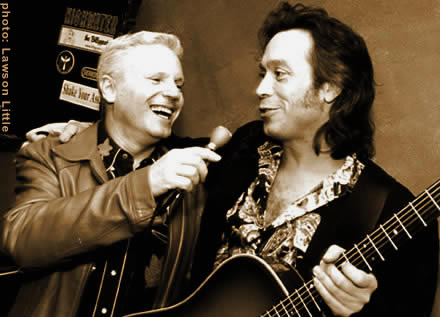
 |
||
There have been various waves of music that emerged in reaction to commercial Country, not unlike the way Punk, Grunge, Rap, and Techno emerged in reaction to the pop styles that preceded them. Some call it Alternative Country, or Americana. Around here, you're likely to hear it called Western Beat. That is the genre and scene propagated, proliferated, and otherwise proselytized by the unofficial mayor of Nashville, the schmooze it or lose it poster child himself, the rather amazing Billy Block. He is our feature interview this month, a very motivated and compelling character.
A Western Beat gig starts with a few tunes by the formidable house band, lately called Vacation Bible School. That's followed by the Medicine Show, where 4 or 5 songwriters do a couple of songs apiece, backed up expertly by the house band. (The band members will have charts supplied by the writer, and will have run the tunes down once right before the show.)
Somewhere around 8 PM, the Western Beat show begins. There are usually five bands for a half hour each. (That plus the Medicine Show is a lot of entertainment for five bucks.) The lineups are consistently good, and often feature out of town acts passing through. The show is broadcast on the web and on the radio.
The multi-faceted efforts of Billy Block have been instrumental in making this style of music as big as it is and is still becoming. It's also fueled by huge talents like Steve Earle, Lucinda Williams, Rodney Crowell, John Hiatt, and many others. The difference is that each of those artists is, understandably, promoting their own music.
Billy Block is a brainstorming operator dedicated to promoting the genre and raising the profiles of many artists that have been flying under baby boomer radar for most of their musical lives. He may yet help to change all that, and make this style much more widely accepted, as acts like Buddy and Julie Miller and Gillian Welch and David Rawlings are starting to prove. The unpredictable spike in Bluegrass interest due to the success of Alison Krauss and the O, Brother soundtrack, also speaks to the fact that baby boomers are looking for music that's meaningful to them, not sitcom dance routine pop music made by former Mouseketeers.
As huge conglomerates seem to flounder in their efforts to reach this busy and progressively computer-crazy audience, it may be up to entrepreneurs like Billy Block to find new, more viable acts and avenues to parade them down. In the following interview, Billy Block sheds some light on this growing scene and where it may be headed. continue to interview